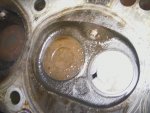Hello all,
I have a 2.5 L Mercruiser (120 hp) from 85' that I just changed the oil on before the weekend's boating and have now discovered water in the oil. Not a lot, not even enough to raise the level on the dipstick to be noticable but it was in there. over the weekend, before discovering the oil problem i ran it for three days, probably for three hours a day or so. So last night I took the head and manifold off and looked for cracks in both (none that I can see) and checked the gaskets. The head gasket looks like crap and the manifold gasket doesn't look much better. There was surface rust in the third cylinder (and about a table spoon of water on the piston) that I cleaned out with paper towels and penetrating oil.
This cylinder also has bad exhaust valve (see picture). Could the exhaust valve damage be caused by water getting in the cylinder and causing it to heat and cool to quickly or over-pressurized? I didn't see any cracks in the cylinder walls so I think I may have lucked out and the cause is the head and manifold gaskets? Compression wasn't great on this cylinder last time I checked (100 or so) while the others were 130. Could water get by the pistons at that compression?

After reading the archives I know I should have done a leak down test before tearing into the motor, but the big question I have for you now is should I pull the motor and look under pistons just to make sure the block isn't cracked below the pistons (where I can't see now), or just put back together and do a leak down test?
Thanks for your time,
-Tom
I have a 2.5 L Mercruiser (120 hp) from 85' that I just changed the oil on before the weekend's boating and have now discovered water in the oil. Not a lot, not even enough to raise the level on the dipstick to be noticable but it was in there. over the weekend, before discovering the oil problem i ran it for three days, probably for three hours a day or so. So last night I took the head and manifold off and looked for cracks in both (none that I can see) and checked the gaskets. The head gasket looks like crap and the manifold gasket doesn't look much better. There was surface rust in the third cylinder (and about a table spoon of water on the piston) that I cleaned out with paper towels and penetrating oil.
This cylinder also has bad exhaust valve (see picture). Could the exhaust valve damage be caused by water getting in the cylinder and causing it to heat and cool to quickly or over-pressurized? I didn't see any cracks in the cylinder walls so I think I may have lucked out and the cause is the head and manifold gaskets? Compression wasn't great on this cylinder last time I checked (100 or so) while the others were 130. Could water get by the pistons at that compression?

After reading the archives I know I should have done a leak down test before tearing into the motor, but the big question I have for you now is should I pull the motor and look under pistons just to make sure the block isn't cracked below the pistons (where I can't see now), or just put back together and do a leak down test?
Thanks for your time,
-Tom



















